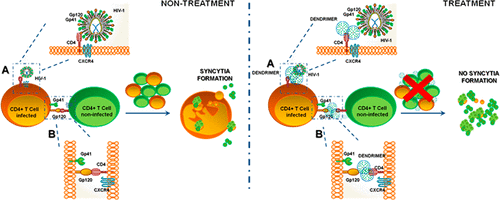当前位置:
X-MOL 学术
›
Bioconjugate Chem.
›
论文详情
Our official English website, www.x-mol.net, welcomes your feedback! (Note: you will need to create a separate account there.)
Anionic Carbosilane Dendrimers Destabilize the GP120-CD4 Complex Blocking HIV-1 Entry and Cell to Cell Fusion
Bioconjugate Chemistry ( IF 4.7 ) Pub Date : 2018-03-23 00:00:00 , DOI: 10.1021/acs.bioconjchem.8b00106 Carlos Guerrero-Beltran 1, 2, 3 , Ignacio Rodriguez-Izquierdo 1, 2 , Ma Jesus Serramia 1, 2 , Ingrid Araya-Durán 4, 5, 6 , Valeria Márquez-Miranda 4, 5, 6 , Rafael Gomez 7 , Francisco Javier de la Mata 7 , Manuel Leal 8, 9 , Fernando González-Nilo 4, 5, 6 , M. Angeles Muñoz-Fernández 1, 2, 3, 7
Bioconjugate Chemistry ( IF 4.7 ) Pub Date : 2018-03-23 00:00:00 , DOI: 10.1021/acs.bioconjchem.8b00106 Carlos Guerrero-Beltran 1, 2, 3 , Ignacio Rodriguez-Izquierdo 1, 2 , Ma Jesus Serramia 1, 2 , Ingrid Araya-Durán 4, 5, 6 , Valeria Márquez-Miranda 4, 5, 6 , Rafael Gomez 7 , Francisco Javier de la Mata 7 , Manuel Leal 8, 9 , Fernando González-Nilo 4, 5, 6 , M. Angeles Muñoz-Fernández 1, 2, 3, 7
Affiliation

|
Cell-to-cell transmission is the most effective pathway for the spread of human immunodeficiency virus (HIV-1). Infected cells expose virus-encoded fusion proteins on their surface as a consequence of HIV-1 replicative cycle that interacts with noninfected cells through CD4 receptor and CXCR4 coreceptor leading to the formation of giant multinucleated cells known as syncytia. Our group previously described the potent activity of dendrimers against CCR5-tropic viruses. Nevertheless, the study of G1-S4, G2-S16, and G3-S16 dendrimers in the context of X4-HIV-1 tropic cell–cell fusion referred to syncytium formation remains still unknown. These dendrimers showed a suitable biocompatibility in all cell lines studied and our results demonstrated that anionic carbosilane dendrimers G1-S4, G2-S16, and G3-S16 significantly inhibit the X4-HIV-1 infection, as well as syncytia formation, in a dose dependent manner. We also demonstrated that G2-S16 and G1-S4 significantly reduced syncytia formation in HIV-1 Env-mediated cell-to-cell fusion model. Molecular modeling and in silico models showed that G2-S16 dendrimer interfered with gp120-CD4 complex and demonstrated its potential use for a treatment.
中文翻译:

阴离子碳硅烷树状大分子破坏GP120-CD4复合物的稳定性,阻止HIV-1进入和细胞间融合
细胞间传播是人类免疫缺陷病毒(HIV-1)传播的最有效途径。由于HIV-1复制循环,感染的细胞通过CD4受体和CXCR4受体与未感染的细胞相互作用,从而在其表面上暴露出病毒编码的融合蛋白,从而导致形成巨大的多核细胞,称为合胞体。我们的小组先前描述了树状聚合物对CCR5嗜性病毒的有效活性。然而,在X4-HIV-1嗜性细胞-细胞融合中提到合胞体形成的G1-S4,G2-S16和G3-S16树状聚合物的研究仍然未知。这些树状聚合物在所有研究的细胞系中均显示出合适的生物相容性,我们的结果表明,阴离子碳硅烷树状聚合物G1-S4,G2-S16和G3-S16可显着抑制X4-HIV-1感染,以及合胞体形成,呈剂量依赖性。我们还证明,在HIV-1 Env介导的细胞间融合模型中,G2-S16和G1-S4显着降低了合胞体的形成。分子建模和计算机模拟表明,G2-S16树状聚合物干扰了gp120-CD4复合物,并证明了其潜在的治疗用途。
更新日期:2018-03-23
中文翻译:

阴离子碳硅烷树状大分子破坏GP120-CD4复合物的稳定性,阻止HIV-1进入和细胞间融合
细胞间传播是人类免疫缺陷病毒(HIV-1)传播的最有效途径。由于HIV-1复制循环,感染的细胞通过CD4受体和CXCR4受体与未感染的细胞相互作用,从而在其表面上暴露出病毒编码的融合蛋白,从而导致形成巨大的多核细胞,称为合胞体。我们的小组先前描述了树状聚合物对CCR5嗜性病毒的有效活性。然而,在X4-HIV-1嗜性细胞-细胞融合中提到合胞体形成的G1-S4,G2-S16和G3-S16树状聚合物的研究仍然未知。这些树状聚合物在所有研究的细胞系中均显示出合适的生物相容性,我们的结果表明,阴离子碳硅烷树状聚合物G1-S4,G2-S16和G3-S16可显着抑制X4-HIV-1感染,以及合胞体形成,呈剂量依赖性。我们还证明,在HIV-1 Env介导的细胞间融合模型中,G2-S16和G1-S4显着降低了合胞体的形成。分子建模和计算机模拟表明,G2-S16树状聚合物干扰了gp120-CD4复合物,并证明了其潜在的治疗用途。



























 京公网安备 11010802027423号
京公网安备 11010802027423号